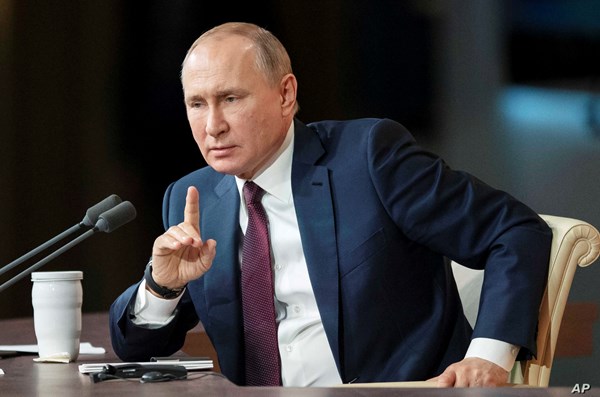Kremlin's ultimatum: the real agenda behind Putin's push for peace talks in Ukraine
After the Shanghai Cooperation Organization (SCO) summit held in Astana on July 3-4, Putin declared that Russian troops would not cease fire in Ukraine until the start of the negotiation process.
"We need to ensure that the opposing side agrees to take steps that would be irreversible and acceptable to the Russian Federation. A ceasefire without reaching this agreement is impossible," he stressed.
Putin further mentioned that he does not want to negotiate through intermediaries:
"We have always advocated for negotiations and have never refused them. The point is that finalizing the conflict with the help of intermediaries alone seems unlikely to me, given the importance of both the competency and mandate of the intermediary."
Meanwhile, experts are convinced that all statements currently made by Russia’s top leadership are merely situational speculations with underlying meanings.
Putin's statements following the SCO summit are a continuation of the same ultimatum that he issued before the Peace Summit in Switzerland, political analyst Taras Zagorodniy believes.
"Putin is pushing for Ukraine to withdraw from four temporarily occupied regions, after which an international conference should formalize the outcome of the war. In essence, he seeks direct negotiations with the United States and still dreams of a Yalta-like 1945 scenario to divide the world. However, in reality, Putin offers not Yalta 1945 but Munich 1938, where Hitler, Mussolini, Chamberlain, and Daladier conceded a small Czechoslovakia to Hitler, which only served as a prelude to World War II," said the expert in an interview with Focus.
According to Taras Zagorodniy, Putin is now in a hurry for several reasons.
"First, I believe there are fears in the Kremlin about the potential return of Donald Trump to power in the USA, as he could be entirely unpredictable for them. Second, Moscow understands that by autumn, the results of Ukrainian special services' strikes on Russia's energy facilities may become prominent, showing serious energy issues for Russians. Ukrainian drones are already reaching Novorossiysk, and recently there was an attack on the remnants of the Russian Black Sea Fleet. At least for these two reasons, Putin is in a rush," the expert noted.
However, according to him, the USA and Europe will never agree to the conditions that Putin is proposing now.
"No one will consider Putin's whims because there is the UN Charter, the 1975 Helsinki Accords on the inviolability of borders in Europe. Hence, Putin is putting forward absolutely unacceptable conditions that cannot be realized in principle," concluded Taras Zagorodniy.
"At present, there are many parties who would like to act as mediators and negotiators in resolving the Russian-Ukrainian war. By doing so, Putin wants to negotiate this status, stating who they are willing to talk to and who they are not. For example, I think they can negotiate with Erdogan ultimately, but in the current structure, a lot depends on China. Obviously, Beijing would like to play the role of a mediator, but it won't be about the previously stated proposals from China. It will be something new and likely hybrid," said political analyst Igor Petrenko in an interview with Focus.
According to the expert, much in this process depends on what precisely will be in the spotlight: a ceasefire or more global-scale issues.
"Regarding far-sighted and global issues, it's clear that no one is truly ready to solve them today, especially Ukraine, which is not ready to trade its territories. However, the issue of ending the war is different and could indeed be on the negotiation agenda now. But this should happen in an analogy with the 'grain deal,' with mediators such as Turkey and the UN. Other formats with influential and authoritative mediators could also be discussed," the political scientist emphasized.
By making statements about the role of intermediaries and the impossibility of a ceasefire before the negotiation start, Putin is trying to maximize the opening bids, said Igor Petrenko.
In a recent interview with The Philadelphia Inquirer, Volodymyr Zelensky suggested the possibility of negotiations with Russia involving intermediaries. One example he cited was the grain agreement, which involved Turkey and the UN. According to the president, such a format had been effective for a long time and could be used when discussing issues of "territorial integrity, energy, and shipping."
In terms of Turkey, the Kremlin recently stated that President Recep Tayyip Erdogan cannot be a mediator in negotiations to resolve the Russian-Ukrainian war. This position was expressed by Kremlin spokesperson Dmitry Peskov during a meeting "on the sidelines" of the SCO summit between Putin and Erdogan, as reported by Russian media.
The Turkish President's administration did not go into details, highlighting only that during the meeting with Putin, Erdogan discussed the Russian-Ukrainian war.
During the SCO summit, without providing specifics, Erdogan stated that "a fair peace that can satisfy both sides (Ukraine and Russia) is possible." He also promised that "Turkey will continue to make efforts to establish peace in the region and the world."
Interestingly, Erdogan previously insisted that no Peace Summit should be held without Russia, as "peace plans excluding Russia will yield no results." Nevertheless, Turkey participated in the Peace Summit in Switzerland and became one of the signatories of the final communique.
Analysts from the American Institute for the Study of War (ISW) have evaluated Putin's latest statements. In their latest report, it is noted that Putin explicitly rejected Russia's involvement in any "meaningful" ceasefire negotiations, demanding the "irreversible demilitarization" of Ukraine instead.
Analysts indicate that in this way, the Russian leader demands Ukraine's actual surrender to cease fire.
According to the experts, Putin's refusal of any ceasefire agreement without Ukraine’s surrender "further illustrates his confidence that Russia can achieve victory by continuing to make incremental advances in Ukraine."
"Putin is betting on a war of attrition without Western support for Ukraine," concludes the ISW report.
